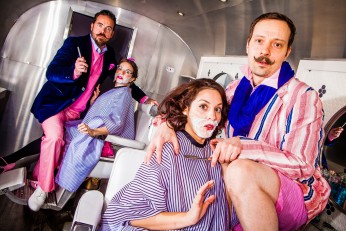
‘WIlde/Earnest’ at KDT
Three very different adaptations of classic British theater make their way through North Texas this week … and all delight in their own way.
Christie, clear
The most traditional of them is also the only original: And Then There Were None, Agatha Christie’s stage version of her own thriller, courtesy of Theatre Britain and playing through Saturday in Plano. Ten virtual strangers are all invited to a mysterious island by their anonymous host, only to find out each has been accused of murdering someone and getting away with it. The murderer proceeds to pick off each of the guests, in accordance with a childhood nursery rhyme. Surely, the only person left alive will be the killer … or his (her?) last victim.
Christie was never much one for careful character development, but damn, she knew plot; even fans who know the outcome may find themselves second-guessing what comes next, and why. But if the dialogue is occasionally stuffy to modern audiences, Christie was also a great one for social justice. As much about the plot, the thriller jabs everything from light punishment for well-heeled perpetrators, religious extremism, warmongering, infidelity, women’s lib and the British class system.
The cast fits well in their roles. Francis Henry has a lovely monologue as a dotty old soldier, and Henry Okigbo cuts a fine leading-man profile as the concerned (or murderous?) Dr. Armstrong. Michael Speck (a Theatre Britain regular) overplays his part as a deceptive and sniveling charlatan, though; Michael Boughton, who also plays an obnoxious character, has much more fun … as does the audience.
The Zoot story

‘Hot Mikado’ at T3.
Ironically, two much older pieces get modern updates that show how the more things change, the more they stay the same. Gilbert & Sullivan’s 1885 comic operetta, The Mikado, is a casually racist bit of Victorian fluff set in Japan but where everyone has Chinese names. It hardly mattered — even then, it was a satire of British aristocracy, glued together with now-classic songs: “A Wand’ring Mistral I,” “Three Little Maids,” “Tit-Willow,” “The Mikado Song.” Theatre 3’s production of David H. Bell’s 30-year-old jazzed-up adaptation, Hot Mikado, undercuts the silliness precisely by embracing it: “This is written in Japanese!” the actors (with one exception, none Asian) repeatedly exclaim, before pausing to add … “uhhh … like we are.” It’s not a willing suspension of disbelief — it’s an elbow to the ribs.
Hot Mikado doesn’t concern itself with Japanese actors — in fact, many of them are African-American, and most are bedecked in Zoots suits Big Band-era primary-color costumes that mix Vegas-fab with swing, jazz and Broadway, as well as the bones of G&S’s original score. This is less an operetta than a party with music, dancing and jokes, all told by an engaging and endlessly energetic cast.
Leading the way is Paul Taylor as Ko-Ko the Lord High Executioner, a lascivious bureaucrat who wants to marry his young ward Yum-Yum (Natalie Coca) except she’s in love with Nanki-Poo (Dennis Wees). Nanki-Poo, though, has been betrothed to the detestable Katisha (Denise Lee). Who marries who? Who cares — it’s all just so much fun.
Lee has a blast in this variation of her Wicked Stepmother role in Rapunzel at DCT last fall (her dry-humping of a mike stand is drop-dead hilarious), and Taylor combines bits of Jack Benny, John Waters and Paul Lynde in making Ko-Ko a sympathetic villain. But the scene-stealer in this bunch is Darren McElroy, whose rich baritone, deft comic timing and charisma as Pooh-Bah electrifies the stage.
Bruce Richard Coleman directed the show in the style of Rocky Horror, and it strikes the tone that T3 wasn’t able to generate a few years back in its version of Pippin: A carnival of delights.
Hipsters gone Wilde
Over at Kitchen Dog, company member Lee Trull has tackled his own modernization of a 19th century monument of theater, Oscar Wilde’s flawless 1895 comedy of manners The Importance of Being Earnest. It is, to me, an unparalleled work of art; I’ve said before, you could cast Steven Seagal as Lady Bracknell and, if he did nothing more than get the words right, it would still entertain you. So why futz with perfection?
The good news is, Trull’s version — called Wilde/Earnest, which he also directs — doesn’t change too much, even as it streamlines the plot, adds musical numbers and double-casts roles. The updates speak to contemporary audiences: Chausable (Leah Spillman) is now a woman who gay-crushes on Miss Prism (Taylor Anne Ramsey); Lady Bracknell (Spillman again) is now just Mrs. B, a helicopter mother with a Highland Park attitude. She’s not sure Jack (Max Hartman) is good enough to marry her spoiled daughter Gwendolen (Jenny Ledel, awesome as always), but tolerates Jack because he’s best friends with her nephew Algernon (Matt Lyle). They all behave like obnoxious hipsters with craft cocktails and overgrown toys to fill their empty lives … just like Wilde’s characters were in his society more than a century ago.
There are two main things that make Wilde/Earnest great. The first is Matt Lyle. The second is Matt Lyle! With his matchy-matchy tailored suits, pencil moustache, thrift-store esthetic and wiry scampering, Lyle brings a giddy wonderfulness to the insufferably vain Algernon. I’d watch a sequel that was just him.
But in truth, the entire cast excels, from the Intern (played with bearded ennui by Sam Cress) to Martha Harms as Cecily to Spillman’s arch doyenne. And Trull gives them all plenty of room to let loose in his Day-Glo set that explodes in color and boundless enthusiasm.















